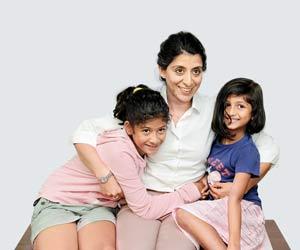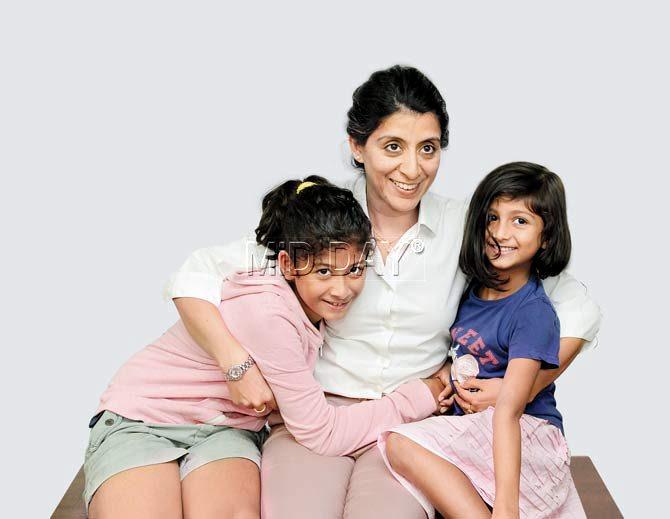Based on her new book, psychotherapist Nupur Dhingra Paiva offers parents a 7-point manifesto on how to fight their kids' inner demons


Nupur Dhingra Paiva with daughters Tara, 9, and Isabelle, 6. Pic/Shadab Khan
ADVERTISEMENT
When five-year-old Armaan walked into child psychotherapist Nupur Dhingra Paiva's clinic, her impression about the kid, whose shoulders were hunched over, was that he was "weighed down by something significant". Armaan's mother would later tell her how he felt unloved, wanted to run away from home and even shoot himself. But, it wasn't until Armaan's father joined the therapist and his wife for chat, an hour later, that Paiva noticed something alter in the child. The kid slowly crawled into his father's lap, and curled up there like a little prawn, Paiva recounted. That the child was craving for his dad's attention was a given.
Vignettes like these form the crux of Paiva's new book, Love and Rage: The Inner Worlds of Children (Yoda Press), where she breaks down conversations she has had in her healing room with both parents and children, to reiterate how love and affection is central to influencing a child's personality. "I felt an urgent need to communicate with the world that what comes into our consulting room is not crazy or bizarre -it is the stuff of ordinary life - ordinary conflicts, struggles and joys. And that mental health distress in adolescence and adulthood is almost entirely based on early life experience, from conception onwards," says the Delhi-based clinical psychologist, of why she wrote the book. "Adults who are interacting with children, as parents, teachers or carers, are sometimes far removed from the lived experience of the child. They become task focussed and outcome oriented - it becomes a lot about achievement, growth and the end result of happiness," she adds. In doing so, Paiva says that people forget "that the growth of the personality is a complex, slow process that needs nurturing".
Here, Paiva, who is also mother to two daughters, offers an "only love-not rage" guide.
>> It takes two
When a child is angry with one parent, it helps to have an available alternative. I have to add that I am not necessarily talking about the heteronormative two parents - male-female couple. Children need a diversity of responsible caregivers, someone who will take it upon themselves to keep the child's emotional needs in mind. The role of mother and father is about a mental attitude, the function they play for the child. It does not have to be a biological parent.
>> We need daddy
Often women find it difficult to let men get involved in caregiving tasks like feeding, bathing and putting to sleep. When a child has emotional access to their fathers, the diversity of experience offers them a wider range of seeing how to live in the world, because men and women live in the world quite differently. Just as an involved father gives a son a sense of someone to look up to, he gives a daughter an experience of being loved and valued - something she will carry with herself into future relationships with men.
>> Prep for school
The first couple of years of kindergarten are not about learning shapes or the alphabet, it is about learning to separate from home. It is a physical/emotional wrench, leaving safety and going to another space - one that can be fun and engaging, provided we can get over the fear of separating from the people we feel safe around. Once children are helped to adapt to this huge change, they can get on with learning. Otherwise, anxiety hampers learning for years afterwards.
Start early with picture story-books or perhaps even a visit to the school for the child to see what it looks like a month or so before the emotional temperature rises in April. Be prepared for repetition for as every parent of a young child knows, once is never enough. Stories that matter the most must be repeated endlessly, without variation so that they can sink in. The story of how everyone leaves home and goes to school is of central emotional import. In fact, it is a rite of passage.
>> Play hard
Using our bodies is a release for everything - anger, anxiety and other feelings - that get stuck in our muscles. In the emphasis on growing children's minds [or getting them to finish homework and projects], we forget about how important it is to be using their bodies. Children are calmer and more attentive, when they have had an experience of using their muscles in activity, especially free play.
>> It's okay to cry
Never tell a child not to cry. All children cry, for all sorts of things, so it is important to first figure out what the crying is trying to communicate. Simply telling a child to stop crying without first trying to understand what is under it, will damage their relationship with you. If the crying is because of sadness, then telling them to stop crying is plain selfish. We do it because we can't bear their expression of sadness. It is far healthier to accept that they are sad, and give them a hug. This kind of acceptance lets them know that while nothing can be done about it, at least their experience is being validated and acknowledged.
>> Don't ignore
Ignoring feelings teaches your child that you don't particularly care for his feelings, just his actions or his/her compliance. This only ensures that the feelings will reappear in a form that is harder to link to its source. In other words, the child will use a defence in order to deal with a feeling, and the anxiety its presence creates.
>> Keep it real
I am not advising that people deny that they also can get angry with their children. "Only love" is not a reality. My aim is to be real with my relationships, including my children. So, I freely express affection - lots of hugs and physical warmth, an hour at bedtime talking about their day and their worries. I also freely express disapproval or annoyance. I explain, and negotiate. As a result, I have very opinionated children who are expressive and open, including about their anger with me or their father. We accept it as real and engage with it as much as is possible at the time.
Download the new mid-day Android and iOS apps to get updates on all the latest and trending stories on the go
 Subscribe today by clicking the link and stay updated with the latest news!" Click here!
Subscribe today by clicking the link and stay updated with the latest news!" Click here!






